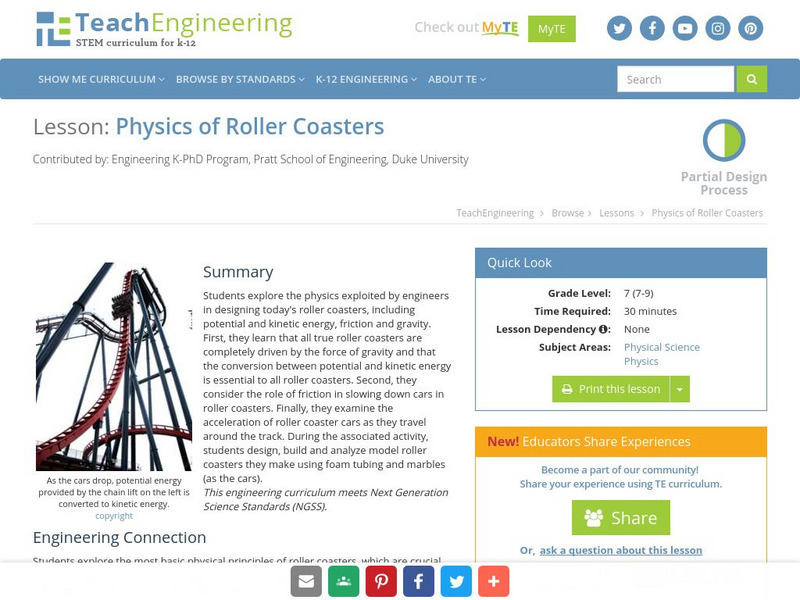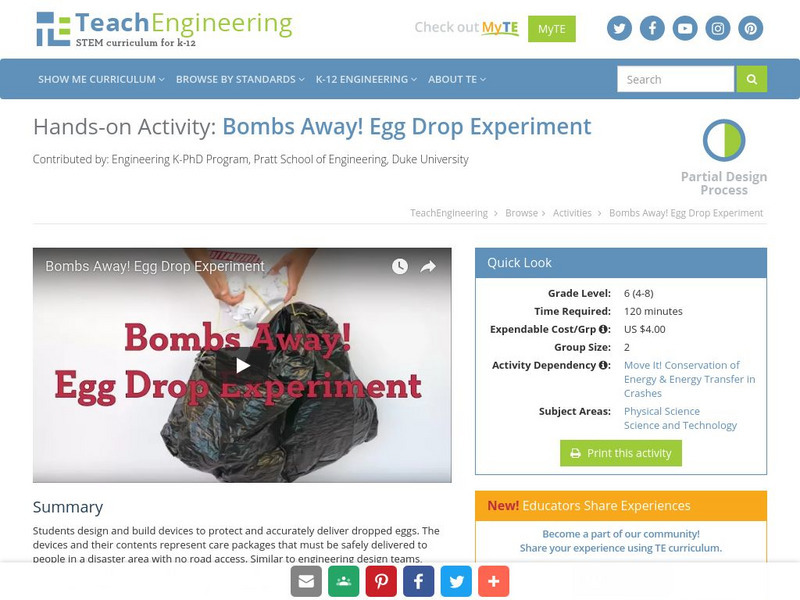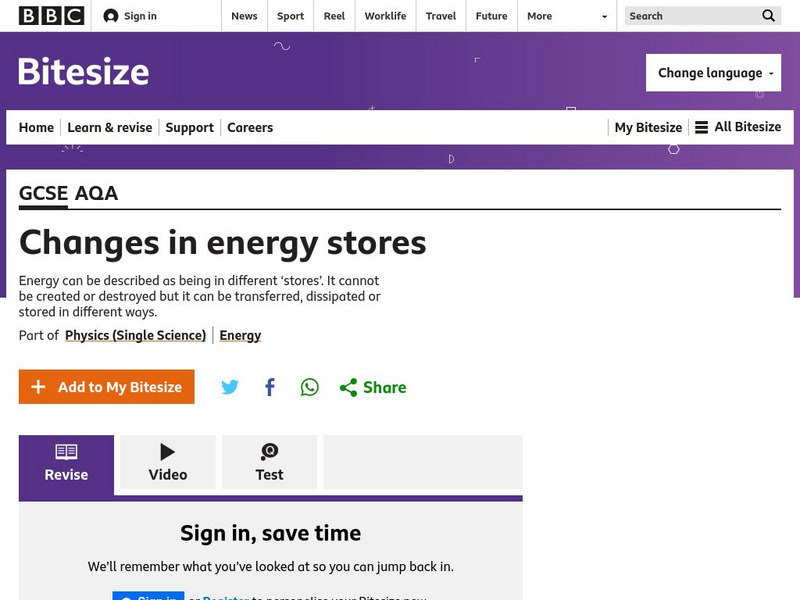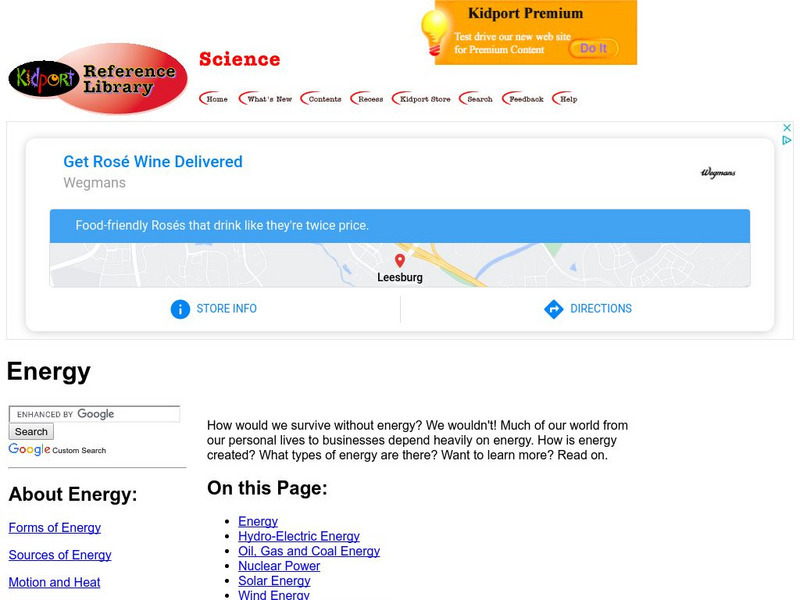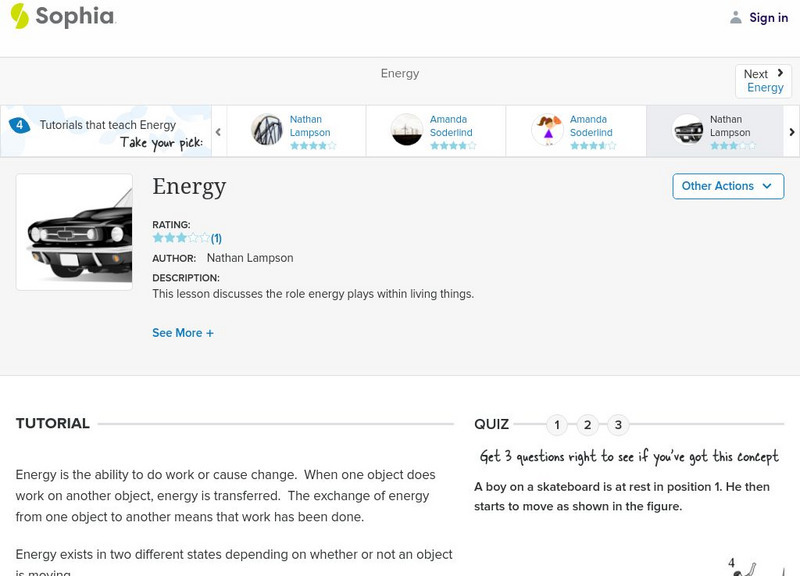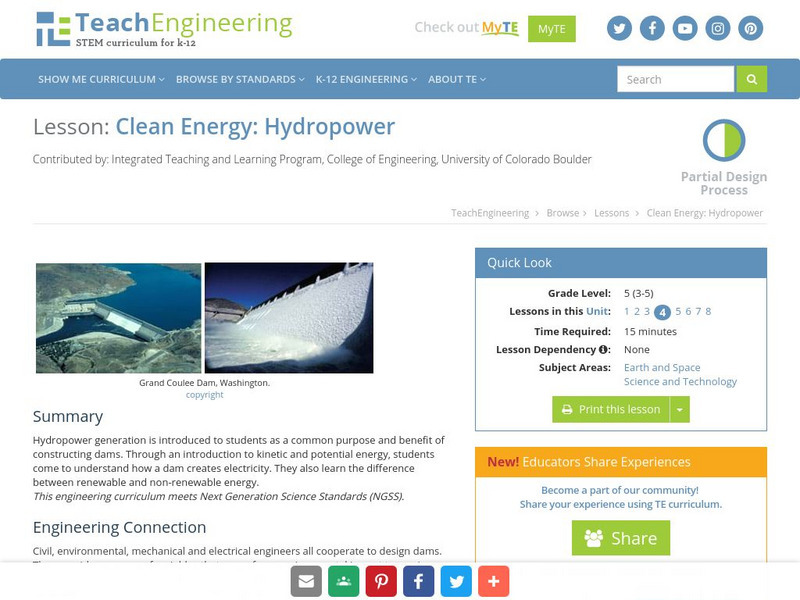TeachEngineering
Teach Engineering: Physics of Roller Coasters
Learners explore the physics utilized by engineers in designing today's roller coasters, including potential and kinetic energy, friction, and gravity. First, students learn that all true roller coasters are completely driven by the...
TeachEngineering
Teach Engineering: Bombs Away!
In this hands-on activity students learn create a device to protect a dropped egg and deliver it close to a target. Students learn about engineering as well as potential and kinetic energy and energy transfer
CK-12 Foundation
Ck 12 Exploration Series: Simulations: Physics: Trampoline
[Free Registration/Login Required] A module to help students understand that as a boy jumps on a trampoline energy is transferred from potential to kinetic energy.
PBS
Pbs Teachers: Spool Racer Experiment
Demonstrate stored and kinetic energy by making a racer toy from a spool and a rubber band.
BBC
Bbc: Gcse Bitesize: Changes in Energy Stores
Energy can be described as being in different "stores". It cannot be created or destroyed but it can be transferred, dissipated or stored in different ways. There are seven main stores of energy: magnetic, internal (thermal), chemical,...
Crescent Public Schools
The Internet Science Room: The Kinetic Theory & Phase Change
This tutorial helps students understand the Kinetic Theory, which explains the effects of temperature and pressure on matter as it goes through phase changes.
E-learning for Kids
E Learning for Kids: Science: Mexican Diner: What Is Energy?
Meet Carlos at his Mexican diner, and he will tell all about energy and energy transformations.
Science Education Resource Center at Carleton College
Serc: Using Your Marbles: Making Energy Work for You
This activity is based on the common experiment of running a marble down a ramp to do work on a cup. Students will be able to see the relationship between mass and energy of the marble and the ramp height.
Physics Classroom
The Physics Classroom: Work and Energy: How Far Will It Skid?
Most driver's education classes teach future drivers that the stopping distance of a skidding car is directly proportional to the square of the speed of the car. See how this situation plays out in this animation.
Science Struck
Science Struck: Difference Between Kinetic and Potential Energy
Explains what kinetic and potential energy are and how they differ.
Kidport
Kidport Reference Library: Energy
A simple introduction to energy, offering information on hydro-electric energy, fossil fuels, nuclear power, solar energy, and wind energy.
Other
Maths Revision: Work, Energy & Power
Basic definitions and examples for the concepts of work, energy, and power. Covers kinetic and potential energy, and conservation of energy.
Science4Fun
Science4 Fun: Energy
What is energy? Article provides a brief discussion of the many different forms of energy.
Other
Ed informatics.com: What Is Work, Energy and Power?
Defines work, energy, and power. Explains the work-energy principle, types and forms of energy, and presents some exercises to try.
Sophia Learning
Sophia: Energy: Lesson 3
This lesson discusses the role energy plays within living things. It is 3 of 7 in the series titled "Energy."
Other
Forms of Energy: Heat, Radiant, Electrical, Chemical, Nuclear Energy
Explains what each of these types of energy is and provides examples.
Physics Classroom
The Physics Classroom: Energy Conservation on an Incline
This site is a discussion and animation about whether the total mechanical energy of a cart rolling down an incline is conserved, which can be determined if there are any external forces acting upon it.
Science Struck
Science Struck: Thermal Energy Facts
Explains what thermal energy is, describes some different types, and presents facts about each type.
TeachEngineering
Teach Engineering: Hybrid Vehicle Design Challenge
This module is written for a first-year algebra-based physics class, though it could easily be modified for conceptual physics. It is intended to provide hands-on activities to teach the overarching concept of energy, as it relates to...
Science Buddies
Science Buddies: Balloon Car
Learners will design, build, and race balloon-powered cars in this fun lesson that teaches about engineering design and kinetic and potential energy.
The Tech Interactive
The Tech Museum of Innovation: Save the Hiker [Pdf]
Can you build a device that will deliver life-saving treatment to someone in a hazardous situation? During this lesson, students will learn how energy is converted and transferred between objects. Working in groups and through the...
TeachEngineering
Teach Engineering: Imagine Life Without Friction
Students are introduced to the concept of inertia and its application to a world without the force of friction acting on moving objects. When an object is in motion, friction tends to be the force that acts on this object to slow it down...
CK-12 Foundation
Ck 12 Exploration Series: Simulations: Physics: Ski Jump
[Free Registration/Login Required] A simulation where students learn about the conservation of energy in a ski jump.
TeachEngineering
Teach Engineering: Clean Energy: Hydropower
Hydropower generation is introduced to students as a common purpose and benefit of constructing dams. Through an introduction to kinetic and potential energy, students come to understand how a dam creates electricity. They also learn the...
Other popular searches
- Potential and Kinetic Energy
- Potential Kinetic Energy
- Potential & Kinetic Energy
- Kinetic Energy Questions
- Thermal and Kinetic Energy
- Kinetic Energy Lesson Plans
- Kinetic Energy of Particles
- Kinetic Energy Problems
- Science Kinetic Energy
- Potentail and Kinetic Energy
- Kinetic Energy Experiment
- Pot Entail and Kinetic Energy


